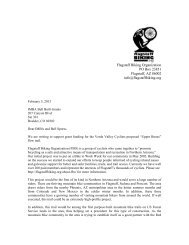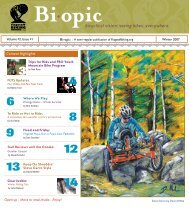Biâ¢opic - Flagstaff Biking
Biâ¢opic - Flagstaff Biking
Biâ¢opic - Flagstaff Biking
Create successful ePaper yourself
Turn your PDF publications into a flip-book with our unique Google optimized e-Paper software.
Volume #1, Issue #5 Bi•opic : A semi-regular publication of <strong>Flagstaff</strong> <strong>Biking</strong> Organization Page 9<br />
Under the Banner of Doping<br />
Our church, the church of cycling is obviously flawed as<br />
are many churches of religion which have concealed,<br />
promoted and perpetrated far more grotesque and<br />
obscene activities compared to doping. Just like the<br />
loyal patrons of these religions marred by transgressions<br />
still find connection to their god, we must keep our<br />
connection to the sport of cycling through what we know<br />
in its beauty and fundamental glory found with each and<br />
every stroke of the pedals.<br />
The architects of a cycling fan’s heart: Fausto Coppi<br />
(who freely admitted to using drugs), Jacques Anquetil<br />
(who also never hid the fact that he took drugs), and<br />
Eddy Merckx (who tested positive more than once in his<br />
career) et. al. were dopers......it has always been crazy<br />
that way. So, if these are the founders of modern cycling,<br />
what do you expect? Look at the roots of sport and its<br />
gladiators. Paul Kimmage wrote about the culture of<br />
doping in cycling with true grit in his book: “A Rough<br />
Ride” and then Willy Voet in: “Breaking the Chain”. But<br />
the fact is the public has always wanted to see people lay<br />
it on the line and make the ultimate sacrifice. We all know<br />
cycling is dangerous, just ask Joseba Beloki, but evidently<br />
that’s not enough. Not even Paris Roubaix will satiate our<br />
appetites. After you make the typical sacrifices: time,<br />
career, sometimes family, what’s left to give; a piece of<br />
your soul (and maybe your life as with Tommy Simpson),<br />
and that’s doping.<br />
Billy Corgan’s line from the Smashing Pumpkins sums it<br />
up well: “with every chemical you trade a piece of your<br />
soul”. We all have the choice to make that trade at some<br />
point in our lives... it is inevitable. It may be plagiarizing a<br />
term paper or putting a little too much octane in your tank<br />
at the lawn mower derby. It is all on different levels and<br />
different playing fields, but it is the same moral issue. To<br />
knowingly cheat... and then to file that information away<br />
in the recesses of your brain like a piece of lead shrapnel<br />
that slowly contaminates your blood, and ironically, if<br />
the toxicity is sufficient, effects your conscious memory<br />
with maladies such as Alzheimer’s. We poison ourselves<br />
to the point of forgetting the black market trades we’ve<br />
made. How much we poison ourselves is up to us.<br />
Ultimately I believe we poison ourselves to feed the ego.<br />
So do all clean riders have control of their ego? No, but<br />
hopefully they can avoid Alzheimer’s. If my theory is true<br />
Barry Bonds won’t be able to remember his home run<br />
record.<br />
Cycling is not immune to this dilemma nor is the stock<br />
market. From Marco Pantanni to Martha Stewart we all<br />
have to make THE DECISION. Do we knowingly cheat?<br />
Being a father I aspire to instill the love and confidence in<br />
my boy that will provide the basis for security and stability;<br />
the nemesis to the soul trade. If our younger generations<br />
can see that it is ok to be who we are, do our best and be<br />
happy with ourselves... wouldn’t that be great? This may<br />
run counter to the megaton media blitz our children (and<br />
ourselves) are exposed to that conveys the ideal man and<br />
woman as people who use the Ab-blaster and Dexitrim<br />
like we used the jungle gym and raisins growing up.<br />
Who We Are and Why We Matter:<br />
The Cycling Counterculture<br />
About three weeks ago, I found myself in a sort<br />
of precarious position. A friend of mine had read<br />
something I’d written—always a bad start—and had a<br />
few contentions to my ideas. The piece I’d written was<br />
in regards to cycling as a counterculture in American<br />
society and how it acts as a sort of catalyst for those<br />
ideals that can be directly or indirectly tied to the<br />
concept of a counterculture. Not surprisingly, she<br />
disagreed rather vehemently with my contention, and<br />
thus the battle ensued: is cycling a counterculture, or<br />
is it simply a collection of obsessed hobbyists? And<br />
more importantly, does it really matter?<br />
For the sake of clarification, let’s define a<br />
counterculture as a group that holds to certain ideals<br />
or a certain lifestyle that is in some way oppositional<br />
to that of established norms in society. As verbose<br />
as that sounds, it boils down quite nicely: folks who<br />
live their lives differently from the majority. In that<br />
regard, cycling, in and of itself, has not proven itself<br />
to be anything more than a hobby. But, consider<br />
the <strong>Flagstaff</strong> cycling scene and everything it<br />
encompasses. It has its own factions—Team Hobo,<br />
the Mutants, the Racers, the Fixies, the Townies,<br />
the Commuters, and so on—and each faction has its<br />
own personality, its own distinct style. These are the<br />
beginnings of counterculture, but only the very tip of<br />
the iceberg. What else is necessary?<br />
The very idea of counterculture hinges on one idea:<br />
choice. A member of a counterculture must make<br />
a choice to live in opposition of cultural norms—i.e.<br />
The pressure in our time is so great. It starts early. From<br />
the AYSO soccer father who yells to “suck it up” when<br />
his boy has had the wind knocked out of him to the eight<br />
year old beauty contestant’s mother who is counting<br />
calories and considering the U.S. Pork Farmers sponsored<br />
Atkin’s diet for her girl. There is so much pressure in the<br />
world beyond our homes. Perhaps our homes can be a<br />
sanctuary for decompression?<br />
So what does all this have to do with riding a bike? Here<br />
is where sport becomes beautiful again because sport is a<br />
metaphor for our lives. Through it we feel moved to cheer,<br />
cry and change our own lives in ways we never imagined<br />
possible. If you are an avid cyclist do you remember doing<br />
your first 10 mile ride or 20 or 40? I remember my first 40<br />
mile ride and it seemed like a Louis and Clark expedition<br />
in that it was an exploration not of America but of my<br />
own boundaries. This journey certainly doesn’t require<br />
doping. It is vivid, real and clean. That is the romance of<br />
this sport, the essence. This is the unadulterated memory<br />
we must hold on to as we progress through our sport or<br />
career where soul trading may be prevalent. We must<br />
remember what we love about our sport and careers and<br />
what they means to us… so we do not let the memory<br />
haze over with self induced fog.<br />
Contact: velo@aspect1.net<br />
Doug Loveday<br />
resides in <strong>Flagstaff</strong> with his<br />
wife Tanja and son Tristan. He is<br />
pursuing his Masters degree in<br />
Exercise Science at NAU while<br />
running his coaching business:<br />
www.cyclingperformance.net.<br />
Dan “D2” Cavallari<br />
is a freelance writer, mechanic<br />
at AZ Bikes, and purveyor of all<br />
things two-wheeled.<br />
riding a bike to work instead of driving, going for<br />
a long ride instead of playing a video game, et<br />
cetera—and sadly enough, many of the most crucial<br />
aspects of cycling lie in direct opposition to how most<br />
Americans live their lives these days. I say sadly not<br />
because cycling in and of itself has proven to be a<br />
devious or disgusting thing; quite the contrary, in fact.<br />
It’s the American way of life that seems to be sinking<br />
into a degenerated hole.<br />
In what context is the idea of cycling as a<br />
counterculture important? Certainly it doesn’t affect<br />
the vast majority of folks interested in throwing their<br />
article continued... Page 13





